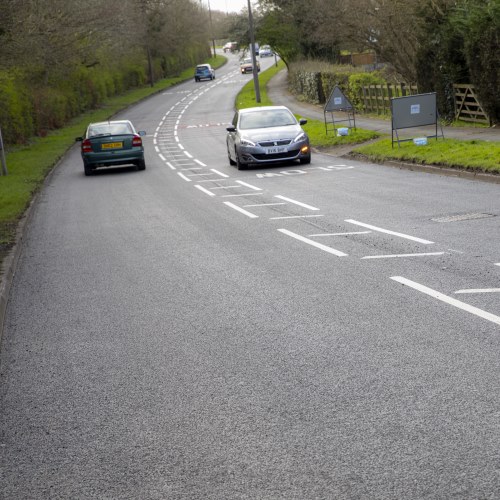RUBBER MODIFIED ASPHALT
Sustainable asphalt using recycled rubber from tyres
NORTHYCOTE LANE, WOLVERHAMPTON

Client
CITY OF WOLVERHAMPTON COUNCIL
Contractor
TARMAC CONTRACTING
Location type
NORTHYCOTE LANE, WOLVERHAMPTON
Completion
March 2020
The challenge
Northycote Lane, a busy road in the Bushberry North Area of Wolverhampton was in need of resurfacing, with visible damage to the surface course. As an important local road, linking to the A460 Cannock Road, it was important that work was completed quickly and road closures were kept to a minimum. In line with the City Council’s commitment to becoming carbon neutral by 2028, their highways team were keen to explore more sustainable ways of working. After discussions with Tarmac’s Technical team they chose a Rubber Modified Asphalt which incorporates recycled rubber from old tyres and a more sustainable warm mix binder. It would be the first time that this innovative asphalt had been used on the City’s roads.
Our solution
Rubber Modified Asphalts incorporate the ground rubber from recycled tyres, helping to reduce the 120,000 tonnes of rubber waste exported from the UK annually. The Rubber Modified Asphalt SMA is a direct alternative to 50 pen SMA and delivers the same performance and surface characteristics in terms of regularity and texture. These asphalts also incorporate proven ULTILOW warm mix asphalt technology as standard meaning they can be manufactured and laid at lower temperatures. This results in a typical saving in CO₂ emissions of around 10% during production. Site safety is also improved from reduced fumes and steam on site and a lower risk of burns.
Results and benefits
Around 500 tonnes of Rubber Modified Asphalt was supplied from Tarmac’s Bayston Hill asphalt plant near Shrewsbury. As well as achieving an 8% reduction in carbon emissions due to the warm mix binder technology, using this material avoided sending around 500 tyres to landfill. Using low temperature asphalt helped knock two days off the original programme time, resulting in savings to the council budget. Councillor Steve Evans, Cabinet Member for City Environment, was impressed with the finish and the speed of completion. The new surface was also noticeable quieter for local residents. Taking an innovative approach to this scheme helped the City Council make progress towards their commitment to be carbon neutral by 2028.
